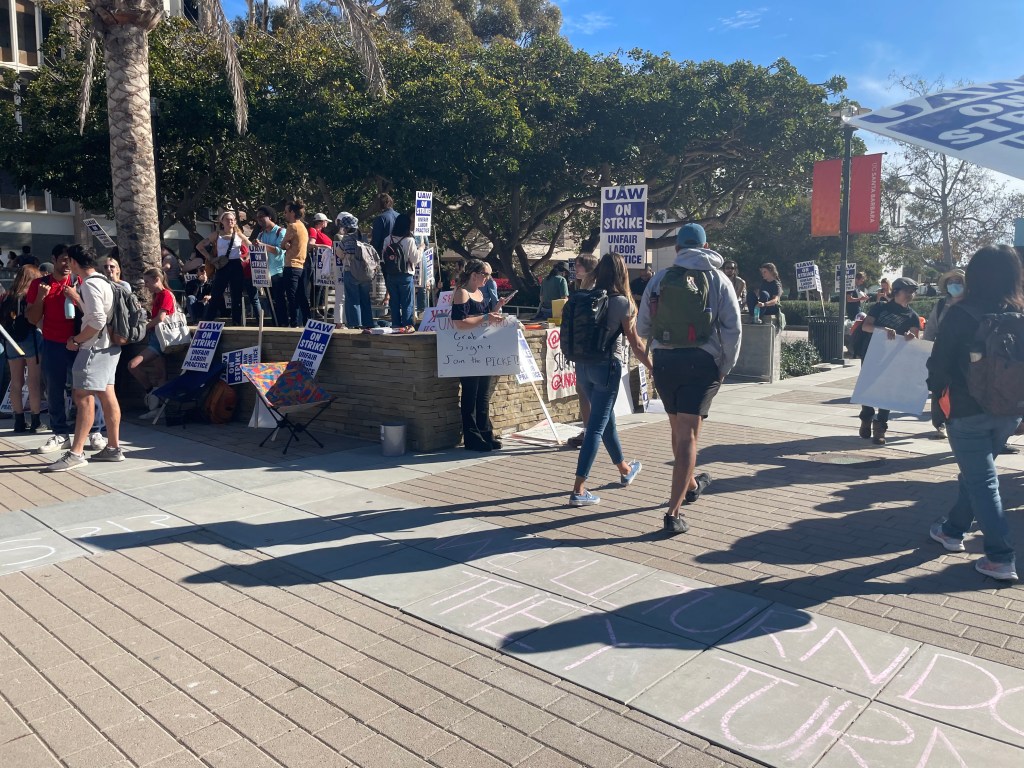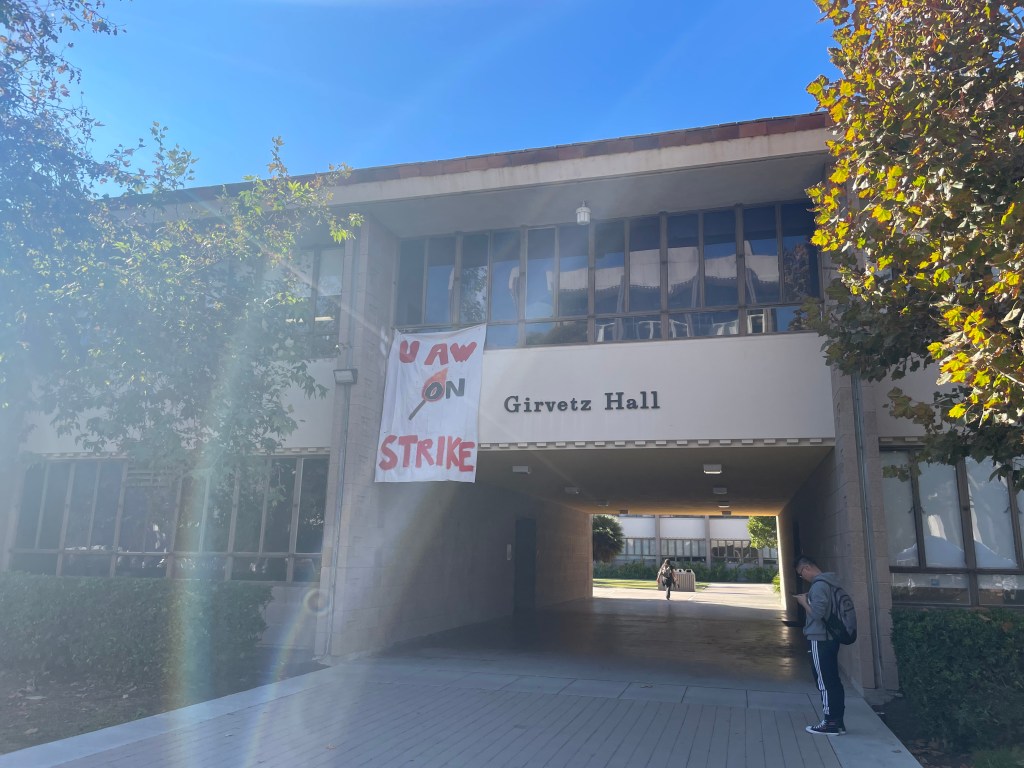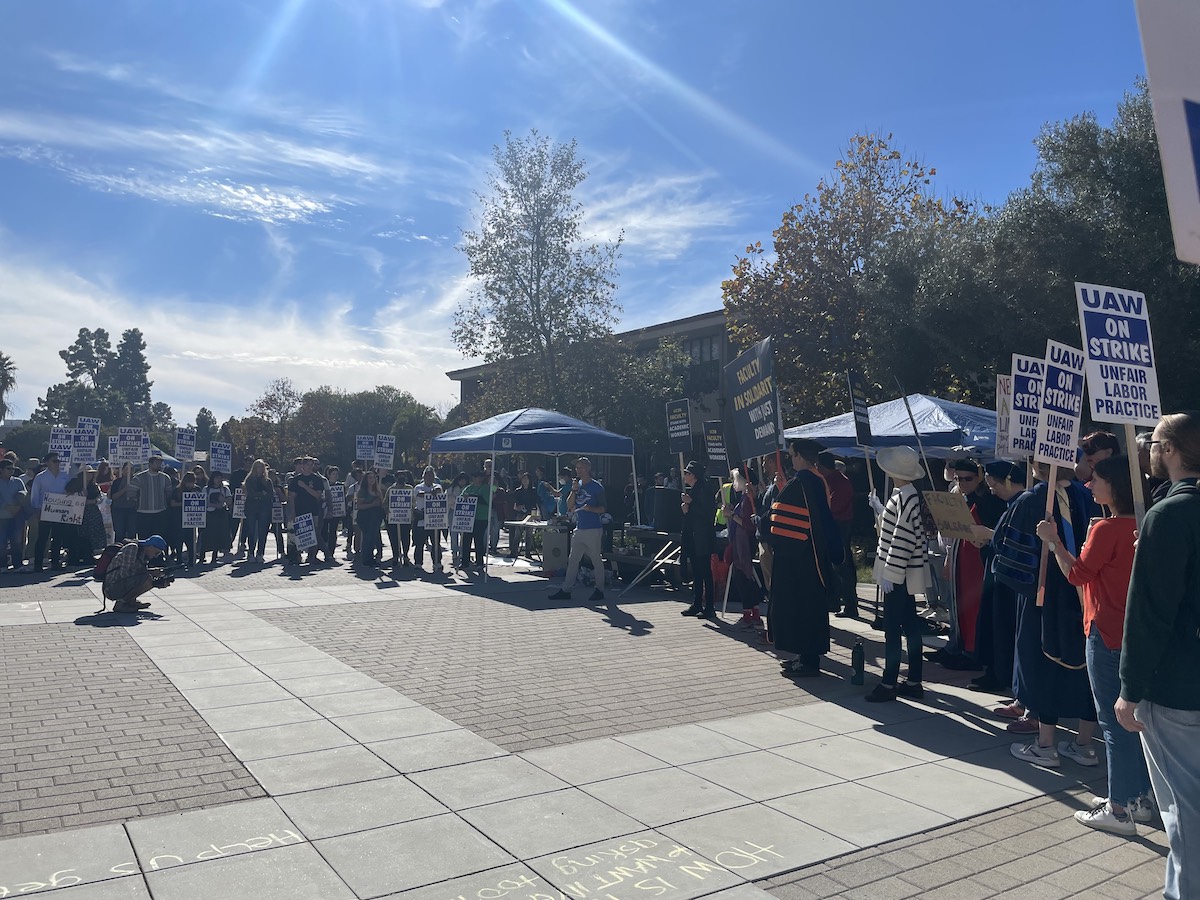“If you live to make the University of California work, which all of you striking workers do, then the University itself should work to make it so that you can live,” said Chase Hobbs-Morgan, a political science lecturer at UC Santa Barbara, to a crowd of picketers on campus Thursday. “At the most basic level, I think we lecturers and faculty should remember not to do the work that you have all decided should be struck.”
Hobbs-Morgan was just one of the many faculty members who gathered outside of UCSB’s library for a rally in support of UC academic workers on strike statewide for a better contract and a fair bargaining process. (The number of alleged, illegal labor practices the union has charged against the UC is now at 31, including unlawful intimidation of striking workers and interference with the bargaining process.) Organized by the UCSB Faculty Association, the rally featured professors of different disciplines sharing messages of solidarity, engaging in chants with the crowd, and holding signs that read “UCSB FACULTY STAND WITH ACADEMIC WORKERS” in bold lettering.
“We think their demands are legitimate … we don’t want the union to be isolated, if you will. We want to show them, ‘Hey, the whole campus is behind you guys,’” said Ralph Armbruster-Sandoval, a professor in the Chicana/o Studies Department. “Me, personally, I was a TA way back in the stone ages of the 1990s, and helped organize a TA union at my campus, UC Riverside, so I just felt like it’s a continuation of what I’ve been doing for a long time.”
The rally’s speakers touched upon many of the diverse range of proposals made by the 48,000 UAW-represented striking employees across all 10 UC campuses, but mostly focused on the topic of raising workers’ wages to meet the cost of living in Santa Barbara.
“The cities where UCs are located are ridiculously expensive to live in,” said Wendy Santamaria, a UC alum and local community organizer with CAUSE. “Making ends meet here in Santa Barbara is an extreme sport,” she said, referring to what the UC currently pays its student workers as “starvation wages.”
According to the latest union update released on Thursday, “UC claimed that paying wages that lift workers out of the federal classification of ‘Rent Burden’ — i.e., being required to pay more than 30% of your income on rent — would be ‘overwhelming.’ But the total amount that all four bargaining units are asking for amounts to just 4.5% of UC’s total budget.” The UC’s 2021-22 budget is $44 billion.
“That’s a fair price to pay for world-class teaching and research,” the update continued. “And UC, as the state’s largest landlord, has helped drive the housing crisis that impacts its workers.”

At UCSB, housing has been especially contentious. “Even grad students living in subsidized housing, paying $800 a month, are rent-burdened,” said Michael Nishimura, a graduate student in the philosophy department. Nishimura said that grad workers at UCSB have had to take on multiple jobs, such as working at coffee shops or startups, to make ends meet.
The current base salary is slightly less than $24,000 a year for TAs who are paid for about 20 hours per week, according to Nishimura. The union’s proposal is a $54,000 annual base salary for graduate student workers, and $70,000 for postdocs. The University’s proposal, a 7 percent increase in the first year, and 3 percent increases in subsequent years, is “not even close to what we’re asking, and with inflation, we would essentially be taking a wage cut every year,” Nishimura said. If the university’s proposal were put in place this year, in five years from now, entry-level TAs would not even be making $30,000 per year.
UC Provost Michael T. Brown, in a letter sent out on Tuesday, said that the Office of the President “is clear that housing costs are a significant challenge for many Californians” and that UC will “continue to work diligently to provide support to our students in this area through below-market housing programs and other means.
“Tying compensation directly to housing costs, however, could have overwhelming financial impacts on the University,” the letter continued. “One review of the Union’s proposal predicts an annual unfunded obligation of at least several hundred million dollars, with inflationary pressure and no cap.”
According to union representatives, the UC’s latest proposals include raises for student researchers “that are as low as $132/month increase … this will leave entry-level SRs paying an average of 56% of their income on rent.” The union also stated that the University wants to call some of their earnings “student support,” which “would block some of [their] earnings from being covered by the union contract” and, without that protection, could lead to the “UC [reducing] them unilaterally or [taking] them away.”
On Monday, the UC Office of the President issued the statement that, under their proposals, “wages for UC academic employees would be among the top of the pay scale among the top public research universities, and more comparable to private universities such as Harvard, MIT, and USC.” In addition, they said that Academic Workers “make meaningful contributions to the University’s teaching and research mission … and we believe our offers of fair pay, quality health and family-friendly benefits, among other proposals, are fair, reasonable, and responsive to the union’s concerns.”
However, the union’s Thursday update maintained a conflicting perspective, saying that “UC’s pay falls below all their self-identified peer institutions, including Harvard, Stanford, Yale, and even public schools like the University of Michigan, where living costs are far less.”
Another demand made by UAW’s bargaining team is the reduction of non-resident tuition paid by international workers. The union stated on Thursday that the “UC claims they can’t waive the non-resident tuition for international workers, but they already waive NRST for 60 percent of international workers. We want to extend that to all workers to make it equitable, and to guarantee the benefit in the contract so that it’s enforceable and can’t be taken away at any time,” adding that, “No one should have to pay to work at the University of California.” According to the UC, “for all Academic Student Employees (TAs/Readers/Tutors) and Graduate Student Researchers with a 25% appointment or greater, UC already covers $13,707 to $22,248 for tuition and fees, depending on the charges assessed by the campus.”
Sign up for Indy Today to receive fresh news from Independent.com, in your inbox, every morning.
Local UAW-2865 member Taudee Wang, an international PhD student from Australia, spoke at Thursday’s rally. He described one instance while teaching a summer Zoom class in which he “discovered we were caught in a vicious game.” Wang explained that for an in-state UCSB student, the cost of tuition and fees is “just over $5,000 per quarter, and it’s triple that if you’re an international undergraduate student.” His point was that a domestic, in-state undergraduate student at UCSB pays in just one year what he paid for his entire four-year undergraduate degree in Australia: the equivalent of around $16,000 USD.
“So there I sat, talking to a bunch of blank Zoom screens in my summer class — 60 percent rent burdened and owing my housemate more than $2,000 while waiting for the UC to pay my summer TA-ship check,” Wang continued, “and thinking about the thousands of dollars my students were paying for a so-called ‘world-class educational experience.’ It turns out, my students pay far too much to be in the classroom, and I get paid far too little to be there, too.”
Provost Brown, in response to the union’s proposal to waive out-of-state tuition for international other non-resident graduate students, said that the same taxpayer funding that partially subsidizes the cost of educating California resident students does not exist for non-residents. “We have a range of ways in which we support international graduate students, and we work hard to attract the best talent in the world,” Brown said. “But if we were to provide remission of out-of-state supplemental tuition, non-California student employees would in effect receive a larger compensation package than California resident student employees for doing the same work,” his point being that the result would be “unfair.”
Wang also brought up the UAW contract demand to defund UC campus police forces as “a matter of community safety” and to help fund workers’ wage increases. He explained that where he is from, universities do not have their own police forces. “They don’t spend $300,000 a day on things like military surveillance equipment to manage student discontent, as they did during the COLA strikes at UC Santa Cruz in 2020,” he continued. “Indeed, campus police forces often emerged and gained strength in the ’60s and ’70s specifically as an attempt to manage student unrest. So make no mistake: The UC police is not here to preserve our safety; it’s here to manage student unrest.”
The UC seems to have no intention of defunding the UCPD, and instead, have had “many people throughout the UC community … working together on the University of California Community Safety Plan, a transformational approach to safety and security at UC,” according to Ryan King, a representative of the UC Office of the President. “Among other things, the plan outlines the critical roles of our police officers in the new model, and how they will coordinate and collaborate with other service providers to ensure that members of the UC community are and feel safe.”
Faculty who spoke at Thursday’s rally made calls of action to both the University and the colleagues who were not standing with them. The suggestion that classes and finals should not be held if they interfere with the strike was reiterated throughout the rally and met with cheers of approval from the crowd. Faculty at UCSB are not alone; the union’s Friday update said that “classrooms and labs remain closed across all 10 campuses.”
“It’s the people who aren’t out here who really need to be,” said Harold Marcuse, a professor in the school’s History Department. Marcuse specifically called out UCSB Chancellor Henry T. Yang, who received a 28.4 percent raise earlier this year, and the school’s deans, saying that they should “take the lead … and stand in solidarity with [their] people,” meaning UCSB’s employees, and not “toe the line of what the University Office of the President tells [them] in how to negotiate.”
Armbruster-Sandoval said that support for the strike mostly trends toward faculty and students in the humanities and social sciences, but that “there’s also a lot of folks in STEM areas” who have expressed their solidarity with picketing workers. “There’s a thousand faculty at UCSB, and today we might have had 50, which is awesome, but of course we’d like to get 100 or 150,” he said. “If the faculty respect the picket line, which is by sort of suspending labor, that is really going to grind the system down.”

When asked about the suspension of labor among faculty, Armbruster-Sandoval explained that lecturers represented by the American Federation of Teachers union cannot “respect the picket line by stopping work,” as it is against the contract that came out of their own bargaining with the University in 2021. On the other hand, he said, UC faculty in the Academic Senate Faculty Association do not have the same contractual limitation, but are “being threatened” by the Senate faculty’s code of conduct to not participate in the strike. “Supposedly, we might be violating this code of conduct, and are being told we need to continue working,” he said.
However, in line with the Higher Education Employee Relations Act, a letter sent out by the UC Academic Senate Division Chairs states, “In strikes by represented employees, Senate faculty who are not managers or supervisors have the right to respect the picket line, and may do so if they so choose. Employers may not discipline employees, such as faculty, for doing so.”
“There’s a little bit of ambiguity about that, and it causes a lot of head-scratching, but I’m under the belief that we can strike,” Armbruster-Sandoval said.
The letter also states that in accordance with Senate faculty responsibilities, Senate faculty are still expected to evaluate student work, “which is generally understood to include the assignment of grades.” Since TAs systemwide said they are prepared to withhold grades should the strike continue, Senate chairs are encouraging faculty to have their TAs provide them with “up-to-date grades for any assignments immediately.”
Armbruster-Sandoval continued on to say that the “nature of the negotiations,” and how quickly things between strikers and the UC are settled, will largely determine whether or not finals that are still scheduled to take place in a few weeks will go forward. “It depends on who you ask … I think there’s some faculty who are very committed to the union and to the issues here; I think they will cancel their finals, or amend them in some way that enables them to register support for the strike,” he said. Some faculty are ahead of that curve and have reportedly already canceled classes and exams or moved them online.
Speaking of cancellations, UCSB’s first canceled campus event in support of the strike has been reported. The decision follows Wednesday’s notice that the California Labor Federation called for the cancellation of all speaking engagements, meetings, and events on UC campuses until the strike is over.
The Carsey-Wolf Center at UCSB issued an announcement that “in accordance with the recent statement from the UAW and the California Labor Federation,” their screening of the film Altiplano will be postponed to a future date. “Postponing the event will allow the CWC and the Media Fields graduate student conference to stand in solidarity with the union’s call to cancel on-campus events in light of the UAW Academic Workers Strike,” the announcement read.
As the fourth day of the strike came and went, striking UC employees have caught national attention and have joined a growing picture of nationwide worker activism, especially among young professionals, who have been calling on legislators to reinforce and protect workers’ rights. “We have already taken inspiration from comrades elsewhere,” Nishimura said, referencing academic workers’ strikes at Columbia, the University of Michigan, and NYU, as well as the workers salting at Amazon, “and hope to inspire fellow workers when we win!”
Congressmember Salud Carbajal, a UCSB alumnus, issued a statement in support of UCSB’s student workers on Wednesday, saying, “As a proud Gaucho, I stand in solidarity with the student researchers and academic workers who are taking a stand for better wages, benefits, and working conditions by striking at UC campuses across our state.”
Strike participation across UC campuses is growing, according to the union’s latest strike update, with more picketers and faculty turning up to support the walkout on day four than on the first three days.
“It was nice to see faculty supporting our efforts, and great to hear them speak out on these issues even if they can’t strike themselves,” said one striking TA in the Global Studies Department who wished to remain anonymous. “It made me recognize that professors in all departments could be doing a lot more to support the strike.”
Progress at the bargaining table at large has been made, according to union representatives. Since Monday, the UC has gone from “refusing to meet, to agreeing to meet for two hours at a time, to finally agreeing to day-long negotiations.” The parties have, so far, “made progress on issues related to Parking and Transit, Appointment Notification, and Paid Time Off. These proposals reflect Academic Workers’ priorities to receive more transit benefits and better job security,” union officials said.
On Friday, the union announced that they “have reached agreement on a few issues — such as health benefits improvements for Postdocs — which, while important, are not the major ones dividing the parties.” They will be back on strike lines Monday morning.
Support the Santa Barbara Independent through a long-term or a single contribution.





You must be logged in to post a comment.